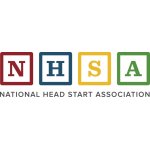
National Head Start Association
NHSA's vision is to lead—to be the untiring voice that will not be quiet until every vulnerable child is served with the Head Start model of support for the whole child, the family and the community—and to advocate—to work diligently for policy and institutional changes that ensure all vulnerable children and families have what they need to succeed. NHSA's mission is to coalesce, inspire, and support the Head Start field as a leader in early childhood development and education.
We are compelled to fulfill this mission by the promise of all the possible outcomes:
one powerful, united Head Start voice; and
a collegial, collaborative Head Start field, one that is a valuable and valued partner and resource to early childhood development and education; and
nonpartisan support of increased Federal commitment to Head Start; and, ultimately; and
healthier, empowered children and families and stronger, more vibrant communities.
We are compelled to fulfill this mission by the promise of all the possible outcomes:
one powerful, united Head Start voice; and
a collegial, collaborative Head Start field, one that is a valuable and valued partner and resource to early childhood development and education; and
nonpartisan support of increased Federal commitment to Head Start; and, ultimately; and
healthier, empowered children and families and stronger, more vibrant communities.
Alexandria, Virginia, United States
Alexandria, Virginia, United States
Company Information
The National Head Start Association (NHSA) is a nonprofit organization committed to the belief that every child, regardless of circumstances at birth, has the ability to succeed in life. NHSA is the voice for more than 1 million children, 245,000 staff and 1,600 Head Start grantees in the United States. Since 1974, NHSA has worked diligently for policy changes that ensure all at-risk children have access to the Head Start model of support for the whole child, the family and the community.
Company History
Head Start is the most important social and educational investment in children, families, and communities that the United States has ever undertaken. The Head Start Project was launched in 1965 as a comprehensive child development program. Over the past 50+ years, it has provided a window of opportunity for success in life to more than 37 million low-income and other vulnerable children and their families across the United States. Head Start has remained strong in the face of changing political and fiscal climates because it has continually improved the services it delivers to children and families and responded to the changing needs of local communities.
In 1964, President Lyndon Johnson asked Sargent Shriver to convene a panel of child development experts to design a program to help communities meet the needs of disadvantaged preschool children. The panel report—named the Cooke Report after its chair Dr. Robert Cooke—became the blueprint for Project Head Start.
Project Head Start was launched as an eight-week summer program by the Office of Economic Opportunity in 1965. It was designed to help break the cycle of poverty by providing preschool children of low-income families with a comprehensive program to meet their emotional, social, health, nutritional, and psychological needs and support the families in improving their lives. Head Start was envisioned as an eight-week summer program staffed by volunteers from across the nation. The plan was to open the doors to a few thousand children nationwide. When more than 561,000 children showed up, each one was welcomed with open arms, and Head Start was enthusiastically received by education, child development specialists, community leaders, and parents.
Head Start now serves more than one million children and their families each year in urban and rural areas in all 50 States, the District of Columbia, Puerto Rico, and the U.S. Territories, including many American Indian, Alaska Native, and migrant children.
In 1969, Head Start was transferred from the Office of Economic Opportunity to the Office of Child Development in the U.S. Department of Health, Education and Welfare, and is now a program within the Administration on Children, Youth and Families in the Department of Health and Human Services. A well-established, though still innovative program, Head Start has had a strong impact on communities and early childhood programs across the country. The program is locally administered by community-based organizations and school systems. Grants are awarded directly by the Department of Health and Human Services Regional offices, except for the American Indian and Migrant programs, which are administered from Washington, D.C.
In 1964, President Lyndon Johnson asked Sargent Shriver to convene a panel of child development experts to design a program to help communities meet the needs of disadvantaged preschool children. The panel report—named the Cooke Report after its chair Dr. Robert Cooke—became the blueprint for Project Head Start.
Project Head Start was launched as an eight-week summer program by the Office of Economic Opportunity in 1965. It was designed to help break the cycle of poverty by providing preschool children of low-income families with a comprehensive program to meet their emotional, social, health, nutritional, and psychological needs and support the families in improving their lives. Head Start was envisioned as an eight-week summer program staffed by volunteers from across the nation. The plan was to open the doors to a few thousand children nationwide. When more than 561,000 children showed up, each one was welcomed with open arms, and Head Start was enthusiastically received by education, child development specialists, community leaders, and parents.
Head Start now serves more than one million children and their families each year in urban and rural areas in all 50 States, the District of Columbia, Puerto Rico, and the U.S. Territories, including many American Indian, Alaska Native, and migrant children.
In 1969, Head Start was transferred from the Office of Economic Opportunity to the Office of Child Development in the U.S. Department of Health, Education and Welfare, and is now a program within the Administration on Children, Youth and Families in the Department of Health and Human Services. A well-established, though still innovative program, Head Start has had a strong impact on communities and early childhood programs across the country. The program is locally administered by community-based organizations and school systems. Grants are awarded directly by the Department of Health and Human Services Regional offices, except for the American Indian and Migrant programs, which are administered from Washington, D.C.
Company Contact
No job openings
